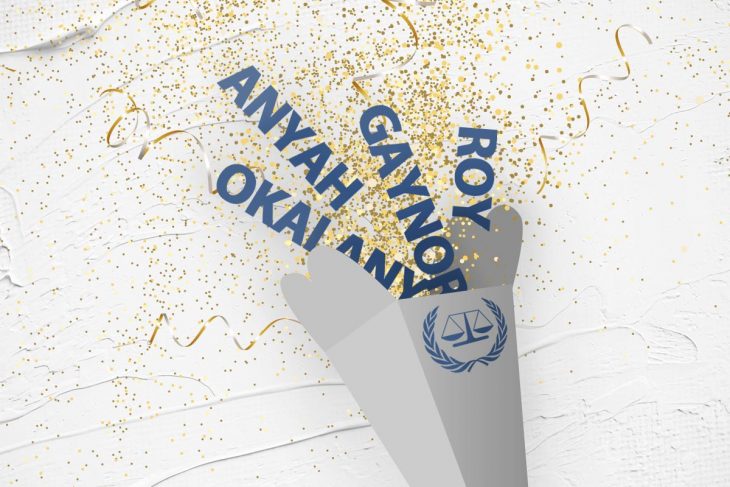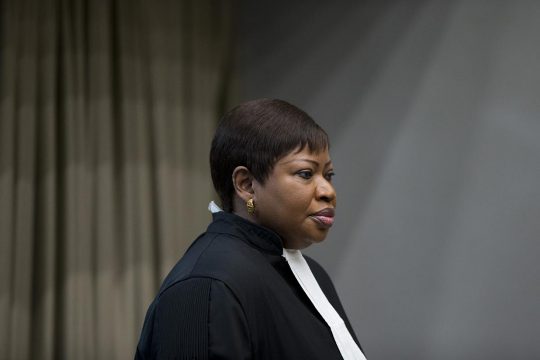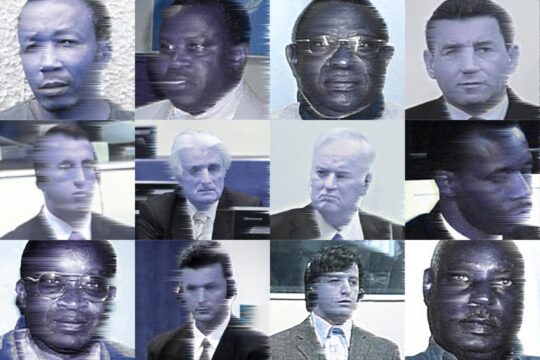The final straight of the race has officially been reached. In less than six months, the name of the new prosecutor of the International Criminal Court (ICC) will be known. This is arguably the most important job in international criminal justice and it is filled every nine years only.
On July 1 the Assembly of State Parties to the ICC (ASP, the governing body of the court) opened the period for member states to nominate candidates. To bolster the usual process of relevant states caucusing in UN corridors and meeting rooms to arrange it all nicely behind the scenes, the ASP had decided that a new committee would help them prepare the election in December. For a year now, five representatives of the different geographical areas of the court have called for applications – and re-issued it when a scant 55 names rolled in – upping the total to a mere 89 completed. They’ve provided breakdowns on candidates by gender, geography and law system. Last February, they declared that 16 suitable potentials (of whom 2 dropped out for personal reasons) were on their long list. Despite the Covid-19 crisis, they interviewed all. They promised a list of 3-6 potential candidates by end of June 2020. And on June 30 they delivered.
But the names of the four people who made it through – from Nigeria, Morris Anyah; Ireland, Fergal Gaynor; Uganda, the only woman, Susan Okalany; and Canada, Richard Roy – came as a shock to the majority of international criminal law observers.
Consider that the court’s reach on accountability for atrocities can extend well beyond the nationalities and territories of its more than 120 members; think about the fact that the next prosecutor will face substantial challenges from the United States, which objects to the ICC’s investigation of war crimes and crimes against humanity in Afghanistan, and from U.S. client Israel, whose neighbour Palestine may or may not have standing to ask the prosecutor to intervene; add into the mix the continued issues of alleged U.K. war crimes in Iraq, Russian ones in neighbouring Georgia and an attempt to deal with crimes against Rohingya muslims in Myanmar, or against African migrants trafficked from Libya; top it off with a continued supply of complex cases prosecuting rebels and Islamicists from a variety of African states – then you know that whoever the next person to take over from Fatou Bensouda may be, they will need to be highly skilled at both prosecution of complex cases and diplomatic manoeuvring. At the least they will need to be robustly independent.
The selection process
The selection committee added in two layers of consideration. On legal competence, a separate assessment was conducted by respected experts. Simultaneously, they set up a new vetting system, using the ICC’s own Security and Safety Section to conduct background checks on all candidates. This was to ensure, specifically, not only that the next ICC prosecutor have “high moral character” but also – quoting the vacancy notice – that they should have “high commitment to the values and guiding principles of the ICC as well as impeccable personal and professional integrity.” This, says the committee in its June 30 report, “implies that the person should not have engaged in harassment, whether sexual or not, bullying, discriminatory behaviour or other forms of abuse of power or malfeasance.”
In the end, no one whose name had been apparently circulating in the corridors of The Hague as front runners – like Belgian Serge Brammertz, current prosecutor at the International Residual Mechanism for Criminal Tribunals, and British Karim Khan, currently leading the United Nations Investigative Team to Promote Accountability for Crimes Committed by Da’esh/ISIL – was on the short-list, except Fergal Gaynor who has appeared in several cases at the ICC.
“It is not business as usual”
“I think it’s very surprising that there are no heavyweights on the list — with the omission of Serge Brammertz and Karim Khan particularly notable, because both men have more international criminal law experience than any of the four shortlisted candidates, particularly in terms of managing large international organisations,” said Kevin Jon Heller of Amsterdam university.
“it’s difficult to judge a selection process that we don’t have full internal knowledge of. But I do think that it is at least legitimate to raise some “surprise” at the fact that two of the four candidates seem to have virtually no international criminal law experience, either substantial or institutional,” concurs Dov Jacobs of Leiden university on Twitter.
Did the committee deliberately exclude some candidates? Heller believes so: “I am also surprised — and disappointed — that the Committee only included four people on the shortlist. They could have included two more. It’s impossible to believe that they could not find six qualified candidates, which leads me to believe the Committee is trying to steer the Assembly of States Parties in a particular direction. I can’t help but think the Committee was afraid the Assembly would choose Brammertz or Khan if given the chance.”
Sarah Kasande of the International Center for Transitional Justice (ICTJ), an NGO, watched from Uganda the surprise among Twitter commentators and suggests that “there is a misguided assumption that only a select group of individuals are qualified for the position.” Liz Evenson of Human Rights Watch has also felt encouraged by the “real emphasis on transparency” by the committee. For others these new names are in fact a breath of much needed fresh air. “It is not business as usual,” declared Sharon Nakandha of the Africa regional office of Open Society Foundations. “New individuals offer an opportunity to introduce fresh ideas and perspectives to the Office of the Prosecutor and the international criminal law space itself. Each of the candidates has excellent credentials and experience, which I believe, can contribute to enabling the ICC to realize its… mission. The very fact that a simple list of four names has reignited an important debate on what makes a good Prosecutor and the implications of new leadership on the ongoing ICC reform conversation is itself positive,” she said.
Protecting the court from misconduct and harassment
Some have focused on getting the new selection committee – and maybe by proxy much of the international criminal justice world – to really take on board the continued complaints about harassment. In a podcast by Asymmetrical Haircuts [a partner with Justice Info] international lawyer Danya Chaikel, who had worked on the issue with the women-led organisation ATLAS, said she knew of at least three people on the longlist who had allegations against them. Now she’s “really impressed” with the way the committee operated. It’s “a surprising historic first,” she points out. “Unbelievably, elected officials at the ICC haven’t had their backgrounds scrutinised like the rest of us.”
Chaikel is now working to get a fair, transparent and safe system made permanent for complaints before all candidates are selected – judges included alongside prosecutors. “This is more necessary now than ever” she says, “as we learn about the high levels of misconduct at the Court."
Best candidates?
There is no doubt in anyone’s mind that this is a crucial year for reform of the ICC. The dam of complaints and frustrations with an underperforming court has burst. The pent-up critiques from states and experts has been channelled into a massive expert review. Various sharp critiques and analyses have triggered storms of finger-pointing debate online. Some of these issues can be dealt with, but the court’s trajectory is a massive oil tanker to turn around in a short space of time.
So, can we take it as read that this four-person list does in fact represent the strongest possible potential people to guide the office of the prosecutor – the court’s engine room?
Take Susan Okalany for example: Nakandha points to her prosecuting “some of the most complex criminal cases including the Kampala 2010 bombings case in which she has confirmed that over 300 witnesses were interviewed, over 500 pieces of physical evidence recovered from the bombing scenes and analysed and over 500 pieces of documents prepared”. In 2017 Okalany won an international accolade as Prosecutor of the Year by the International Association of Prosecutors. Kasande thinks her “extensive experience” had not been counted because simply “she doesn’t belong to that predetermined list of “qualified” candidates.”
Heller agrees that this is a strong line up, despite his caveats. “There is no question that the four shortlisted candidates all have impressive backgrounds in criminal law, which is very encouraging. I’m not someone who thinks knowledge of international criminal law specifically is that important — give me a great domestic prosecutor over an adequate international one any day. It’s also refreshing to see so many “outsiders” on the list — including one, Anyah, whose criminal law experience has been overwhelmingly on the defence side.”
But doubts still occur, even among those who like the “outsiders”. Even though there was plenty of attention to rooting out harassment, women still didn’t apply in large numbers. “Out of 89 applications that were completed, there were 63 male candidates to only 26 female candidates. That in and on itself is disturbing – why are so few women applying for these types of prestigious jobs? The pipeline itself has to be diversified,” argues U.S. law professor Milena Sterio on Twitter.
Defence counsel Kate Gibson points out that it’s already looking a top-heavy male court right now. “If 1 of the 3 male candidates for #Prosecutor is chosen, the @IntlCrimCourt in 2020 will have a male President, 2 male Vice-Presidents, a male Registrar and a male incoming Prosecutor. 2/3 of #ICC Judges are male. "You're welcome" from the female Defence lawyers balancing it out,” she wrote on Twitter.
The geographical factor
The job advert made it clear that states were looking, not just at strong moral character, but also for someone who had a “proven record of independence and impartiality and commitment to upholding justice, accountability and human rights". It’s “an insanely difficult job,” admits Evenson. The moment things go well the court “attract[s] politicized opposition from those who fear judicial scrutiny.” That’s what makes the commitment to independence so important. “The court's officials need to resolutely guard and act on their independence to realize the ICC's full ambitions, even as ICC member countries should also push back on efforts to undermine the court's mandate.”
So, what happens next?
The Bureau of the ICC Assembly of State Parties has “strongly encouraged States Parties to refrain from submitting nominations” in its missives, until the committee completed its work. It has issued the same admonition again that states should “identify, through open and transparent consultations, a consensus candidate.”
Expect loads of speculation with little substance. There’s the “rotation between geographical groups” school of thought – was this the turn maybe of western European and other (known as WEOG) candidates? If so, Canada and Ireland look favourite. But the next ICC president from among the judges may be from that WEOG group of countries. So should the prosecutor be from Africa even though the outgoing Bensouda is from The Gambia? Are Nigeria and Uganda favourites?
Expect more twists
In fact, Heller expects a twist: “It is important to note that the Assembly does not have to choose one of the four shortlisted candidates. It would not surprise me if states nominated heavy hitters who did not make the list. And I would not be surprised if consensus was not achievable in this election.”
The selection committee itself points out that “there is no such thing as a “perfect” candidate,” and cautions anyone to judge on curriculum vitae alone. All those selected showed “genuine interest in justice and the rule of law, the ICC and the cause of international criminal accountability – without fear or favour nor desire for personal advancement, beyond the wish to seek out new challenges,” they say. “Each of them will bring their own, unique and fresh professional perspective to the work of the Court. Likewise, all communicated clearly their appreciation for an organization and a managerial philosophy that value integrity, professionalism, teamwork, diverse and new perspectives, responsible stewardship and accountability.”
Can’t say fairer than that.








